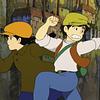Take a photo of a barcode or cover
challenging
dark
slow-paced
Plot or Character Driven:
Character
Loveable characters:
No
Diverse cast of characters:
No
Flaws of characters a main focus:
Yes
challenging
dark
mysterious
sad
tense
medium-paced
Plot or Character Driven:
Character
Strong character development:
No
Loveable characters:
Complicated
Diverse cast of characters:
Complicated
Flaws of characters a main focus:
Yes
I hate the Chief, and Noburu. poor Ryuji :(
adventurous
dark
medium-paced
Plot or Character Driven:
Character
Diverse cast of characters:
Yes
Flaws of characters a main focus:
Yes
** Books 179 - 2016 **
3,2 of 5 stars!
Dark and seductively written, this book is like the ocean; somehow it ease but in the same time it is dangerous. Mishima one of the Japan Author that writes about how principles meets the actual life. There is Ryuji, an sailor that torn between live in land and sea, Fusako, an women that live with his son and faces the uncertainty about long commitment and then there is Noboru, a boy that struggles to be a growing up young man under his family, friends and teacher's influence.
Seriously, I still can't forgot how twisted and disturbing's scene in this book is Definitely, It is not for a reader who have a weak heart and it is also not suitable for children since there is an explisit sexual's scene.
In 1970, He is remembered for his Japan Tradisional ritual suicide by seppuku :O
3,2 of 5 stars!
Dark and seductively written, this book is like the ocean; somehow it ease but in the same time it is dangerous. Mishima one of the Japan Author that writes about how principles meets the actual life. There is Ryuji, an sailor that torn between live in land and sea, Fusako, an women that live with his son and faces the uncertainty about long commitment and then there is Noboru, a boy that struggles to be a growing up young man under his family, friends and teacher's influence.
Seriously, I still can't forgot how twisted and disturbing's scene in this book is
Spoiler
Noboru killed a innocent kitten by himself and also open the inside organ. T.TIn 1970, He is remembered for his Japan Tradisional ritual suicide by seppuku :O
Very disturbing and sad. Writing was marvellous. My first novel in the world of Mishima.
dark
tense
medium-paced
Plot or Character Driven:
A mix
Loveable characters:
Complicated
I found out about Mishima's infamy and death part-way reading through this novel. His beliefs remind me of the villains in the manga Rurouni Kenshin - all of their actions were done to bring Japan to it's past pre-Meji Restoration glory. In a way, it seems like the main character, Noboru, wants the same.
It's interesting to learn about his death. Many speculate, including John Nathan, the translator of this book, that his coup attempt was to provide a backdrop for his grand death. Mishima had a fascination with death, as well as characters in this book .
I recommend briefly reading about Mishima (I glanced his wikipedia page) prior to reading this book. You'll be surprised to find that it seems like he's criticizing his own beliefs.
Noboru, the son of Fusako, idolizes the sea, sailors, ships, and Ryuji - his mother's love interest. Ryuji is a sailor, and everything that Noboru admired. Unfortunately for Noboru, Ryuji begins to tire of his sailor life.
Ryuji started his journey in search of glory and adventure. Many years later, he still felt as if he were searching for that. Ryuji's reflective thoughts reveals the realization that maybe no glory can be found at sea. Knowing Mishima's background, it felt as if the writing here was criticizing himself. A futile chase of glory is relatable between Mishima and Ryuji.
Noboru and Fusako initially know none of this. This leads to a "belief triangle".
Noboru believes in the glory of the sea and the heroics of the sailor. Ryuji lived all what Noboru believes, but is losing sight of the glory and the heroics he used to believe. Fusako believes that Ryuji never had big dreams.
All of this leads to an interesting story. Noboru, and his gang of friends, are unlikable. The Chief believes himself to be a genius, but his philosophies are hard to understand. Is he a Nihilist? Does he just hate Existentialism? Every word he spoke had me rolling my eyes. Noboru, and everyone else, couldn't know any better. The reader will be confused. This, I think, is intended. They are all teenagers with little knowledge of the world. It makes sense that their philosophy doesn't quite make sense.
Or maybe the teenagers are right, they are smarter than all adults.
When Ryuji quits being a sailor, Noboru and his friends feel betrayed. They also lack the insight to realize that a seasoned sailor has his reasons for quitting, other than betrayal. The book ends with the boys planning to kill Ryuji. The final page has Ryuji drinking tea laced with sleeping pills.
How does his death restore glory and heroics? Was it just a way to get back at betrayal? How does it restore order? Why are fathers the worst? These kids are just too smart for me.
Their twisted reasons for murder had me frustrated. The ending is unsatisfying, but it wouldn't work any other way. Part of me wishes that there was another chapter. One where Ryuji lives. One where Ryuji tells the kids his reasons for quitting. One where all the kids realize the Chief is dumb. I'm asking for too much.
When the kitten is killed, you know that someone else will die in the future.
This book is a quick read. It's a dark story with some unlikable characters. The writing is wonderfully descriptive.
It's interesting to learn about his death. Many speculate, including John Nathan, the translator of this book, that his coup attempt was to provide a backdrop for his grand death. Mishima had a fascination with death,
I recommend briefly reading about Mishima (I glanced his wikipedia page) prior to reading this book. You'll be surprised to find that it seems like he's criticizing his own beliefs.
Noboru, the son of Fusako, idolizes the sea, sailors, ships, and Ryuji - his mother's love interest. Ryuji is a sailor, and everything that Noboru admired. Unfortunately for Noboru, Ryuji begins to tire of his sailor life.
Ryuji started his journey in search of glory and adventure. Many years later, he still felt as if he were searching for that. Ryuji's reflective thoughts reveals the realization that maybe no glory can be found at sea. Knowing Mishima's background, it felt as if the writing here was criticizing himself. A futile chase of glory is relatable between Mishima and Ryuji.
Noboru and Fusako initially know none of this. This leads to a "belief triangle".
Noboru believes in the glory of the sea and the heroics of the sailor. Ryuji lived all what Noboru believes, but is losing sight of the glory and the heroics he used to believe. Fusako believes that Ryuji never had big dreams.
All of this leads to an interesting story. Noboru, and his gang of friends, are unlikable. The Chief believes himself to be a genius, but his philosophies are hard to understand. Is he a Nihilist? Does he just hate Existentialism? Every word he spoke had me rolling my eyes. Noboru, and everyone else, couldn't know any better. The reader will be confused. This, I think, is intended. They are all teenagers with little knowledge of the world. It makes sense that their philosophy doesn't quite make sense.
Or maybe the teenagers are right, they are smarter than all adults.
This book is a quick read. It's a dark story with some unlikable characters. The writing is wonderfully descriptive.
challenging
dark
slow-paced
Plot or Character Driven:
Character
Strong character development:
Complicated
Loveable characters:
No
Diverse cast of characters:
Complicated
Flaws of characters a main focus:
Yes
Intense, beautiful and poignant. Mishima does not hold back any punches with this gorgeous novel, detailing the futility of modern life in Japan during the 1960s as the brutal power of men is slowly stripped away by phoney manners and modern comforts. As a thirteen-year-old convinced of his own genius on the cusp of attaining true power of men, Noboru is enamoured with the sea and the ships that brave that unconquerable wilderness. When he and his mother encounter a young sailor, who for many years chased his noble and glorious purpose on the seas, he sees a hero - but slowly the sailor's human weaknesses show through as he falls in love with Noboru's mother. Noboru is convinced that he must return the sailor to his past glory, and redeem him of his crimes.
The setting is remarkable, as Noboru's family live in a highly westernised house and constantly reject Japanese home customs - compounded by the family store, high-end western importers that cater to wealthy actresses and foreign dignitaries. Yet Noboru, and Japan, seems to be held in this unusual limbo of desperately holding onto old customs but ignoring western commodities, buildings and graves that hang like spectres around him.
It reminded me greatly of Catcher in the Rye, with both young protagonists being dissatisfied with the vagueries or modern culture but unlike Holden, Noboru is determined to achieve purity and glorious purpose.
The setting is remarkable, as Noboru's family live in a highly westernised house and constantly reject Japanese home customs - compounded by the family store, high-end western importers that cater to wealthy actresses and foreign dignitaries. Yet Noboru, and Japan, seems to be held in this unusual limbo of desperately holding onto old customs but ignoring western commodities, buildings and graves that hang like spectres around him.
It reminded me greatly of Catcher in the Rye, with both young protagonists being dissatisfied with the vagueries or modern culture but unlike Holden, Noboru is determined to achieve purity and glorious purpose.







